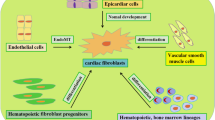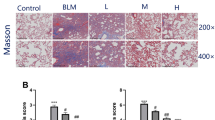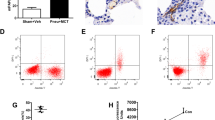Abstract
Background
Pulmonary arterial hypertension (PAH) is a fatal disease characterized by continuous constriction and occlusion of small pulmonary arteries, leading to the development of right ventricular failure and death. Proprotein convertase subtilisin/kexin type 9 (PCSK9) is a kind of serine protease enzyme that increases low-density lipoprotein cholesterol (LDLC) levels through degrading low-density lipoprotein cholesterol receptors (LDLr). However, whether inhibition of PCSK9 can alleviate PAH has not been reported.
Methods and Results
We reported that PCSK9 expression was up-regulated in lung tissues of PAH patients. In addition, we used PCSK9 monoclonal antibody subcutaneously to inhibit PCSK9 expression in mice exposed to chronic hypoxia (10%) in combination with SU5416, a VEGF receptor inhibitor. Hypoxia plus SU5416-induced PAH was attenuated in PCSK9 monoclonal antibody-treated mice compared with wild-type mice. PCSK9 inhibited pulmonary vascular remodeling in mice. Moreover, PCSK9 knockdown significantly altered the proliferation and migration of hypoxia-induced PASMCs. We also found that PCSK9 monoclonal antibody inhibited Notch3 expression in vivo and in vitro.
Conclusion
Our results suggest that the PCSK9-Notch3 signaling pathway is critical for the proliferation and migration of PASMCs and provides a potential drug target for the treatment of PAH.







Similar content being viewed by others
Data Availability
All relevant data are within the paper.
References
Hassoun PM. Pulmonary Arterial Hypertension. N Engl J Med. 2021;385(25):2361–76.
Humbert M, Sitbon O, Yaïci A, et al. Survival in incident and prevalent cohorts of patients with pulmonary arterial hypertension. Eur Respir J. 2010;36(3):549–55.
Humbert M, Sitbon O, Chaouat A, et al. Survival in patients with idiopathic, familial, and anorexigen-associated pulmonary arterial hypertension in the modern management era. Circulation. 2010;122(2):156–63.
Southgate L, Machado RD, Graf S, Morrell NW. Molecular genetic framework underlying pulmonary arterial hypertension. Nat Rev Cardiol. 2020;17(2):85–95.
Galie N, Channick RN, Frantz RP, et al. Risk stratification and medical therapy of pulmonary arterial hypertension. Eur Respir J. 2019;53(1):1801889.
Burki TK. Pharmacotherapy for pulmonary arterial hypertension. Lancet Respiratory Med. 2020;8(11):e81.
Sundararaman SS, Peters LJF, Nazir S, et al. PCSK9 imperceptibly affects chemokine receptor expression in vitro and in vivo. Int J Mol Sci. 2021;22(23):13026.
Stoekenbroek RM, Lambert G, Cariou B, Hovingh GK. Inhibiting PCSK9 - biology beyond LDL control. Nat Rev Endocrinol. 2018;15(1):52–62.
Liu X, Bao X, Hu M, et al. Inhibition of PCSK9 potentiates immune checkpoint therapy for cancer. Nature. 2020;588(7839):693–8.
Liu S, Deng X, Zhang P, et al. Blood flow patterns regulate PCSK9 secretion via MyD88-mediated pro-inflammatory cytokines. Cardiovasc Res. 2020;116(10):1721–32.
Tang ZH, Peng J, Ren Z, et al. New role of PCSK9 in atherosclerotic inflammation promotion involving the TLR4/NF-kappaB pathway. Atherosclerosis. 2017;262:113–22.
Zhang Y, Ying F, Tian X, et al. TRPM2 promotes atherosclerotic progression in a mouse model of atherosclerosis. Cells. 2022;11(9):1423.
Ding Z, Pothineni NVK, Goel A, Luscher TF, Mehta JL. PCSK9 and inflammation: role of shear stress, pro-inflammatory cytokines, and LOX-1. Cardiovasc Res. 2020;116(5):908–15.
Ferri N, Marchiano S, Tibolla G, et al. PCSK9 knock-out mice are protected from neointimal formation in response to perivascular carotid collar placement. Atherosclerosis. 2016;253:214–24.
Hurst LA, Dunmore BJ, Long L, et al. TNFα drives pulmonary arterial hypertension by suppressing the BMP type-II receptor and altering NOTCH signalling. Nat Commun. 2017;8:14079.
Fouillade C, Monet-Lepretre M, Baron-Menguy C, Joutel A. Notch signalling in smooth muscle cells during development and disease. Cardiovasc Res. 2012;95(2):138–46.
Li X, Zhang X, Leathers R, et al. Notch3 signaling promotes the development of pulmonary arterial hypertension. Nat Med. 2009;15(11):1289–97.
Morris HE, Neves KB, Montezano AC, MacLean MR, Touyz RM. Notch3 signalling and vascular remodelling in pulmonary arterial hypertension. Clin Sci. 2019;133(24):2481-2498.
Wang Y, Dai S, Cheng X, et al. Notch3 signaling activation in smooth muscle cells promotes extrauterine growth restriction-induced pulmonary hypertension. Nutrition, Metab Cardiovasc Dis: NMCD. 2019;29(6):639–51.
Zhang Y, Hernandez M, Gower J, et al. JAGGED-NOTCH3 signaling in vascular remodeling in pulmonary arterial hypertension. Sci Transl Med. 2022;14(643):eabl5471.
Zammit C, Liddicoat H, Moonsie I, Makker H. Obesity and respiratory diseases. Int J Gen Med. 2010;3:335–43.
Blankfield RP, Hudgel DW, Tapolyai AA, Zyzanski SJ. Bilateral leg edema, obesity, pulmonary hypertension, and obstructive sleep apnea. Arch Intern Med. 2000;160(15):2357–62.
Haque AK, Gadre S, Taylor J, et al. Pulmonary and cardiovascular complications of obesity: an autopsy study of 76 obese subjects. Arch Pathol Lab Med. 2008;132(9):1397–404.
Sabatine MS. PCSK9 inhibitors: clinical evidence and implementation. Nat Rev Cardiol. 2019;16(3):155–65.
White CM. The pharmacologic role and clinical utility of PCSK9 inhibitors for the treatment of hypercholesterolemia. J Cardiovasc Pharmacol Ther. 2018;23(4):301–8.
Lepor NE, Contreras L, Desai C, Kereiakes DJ. The potential role of anti-PCSK9 monoclonal antibodies in the management of hypercholesterolemia. Rev Cardiovasc Med. 2014;15(4):290–307. quiz 8-9
Tomlinson B, Patil NG, Fok M, Lam CWK. Role of PCSK9 inhibitors in patients with familial hypercholesterolemia. Endocrinol Metab (Seoul). 2021;36(2):279–95.
Lan H, Pang L, Smith MM, et al. Proprotein convertase subtilisin/kexin type 9 (PCSK9) affects gene expression pathways beyond cholesterol metabolism in liver cells. J Cell Physiol. 2010;224(1):273–81.
Zaid A, Roubtsova A, Essalmani R, et al. Proprotein convertase subtilisin/kexin type 9 (PCSK9): hepatocyte-specific low-density lipoprotein receptor degradation and critical role in mouse liver regeneration. Hepatology. 2008;48(2):646–54.
Bonaventura A, Vecchié A, Ruscica M, Grossi F, Dentali F. PCSK9 as a new player in cancer: new opportunity or red herring? Curr Med Chem. 2022;29(6):960-969.
Ding Z, Liu S, Wang X, et al. Cross-talk between LOX-1 and PCSK9 in vascular tissues. Cardiovasc Res. 2015;107(4):556–67.
Yin Q, He M, Huang L, et al. lncRNA ZFAS1 promotes ox-LDL induced EndMT through miR-150-5p/Notch3 signaling axis. Microvasc Res. 2021;134:104118.
Funding
We acknowledge the Nanjing Health Science and Technology development special project fund (YKK19074) for supporting completion of this study. Juan Zhang is the grant recipient and one of the corresponding authors in this manuscript.
Author information
Authors and Affiliations
Contributions
YP performed the immunoblot analyses, analyzed the echo data, and drafted the manuscript. JXM and QWC performed the mouse work, including feeding and coordinating the echography and harvest dates and times. YP and JXM aided in harvesting the mice and analyzing the data. ZJ designed and oversaw the study, and edited the manuscript. All authors read and approved the final manuscript. The authors declare that all data were generated in-house and that no paper mill was used.
Corresponding author
Ethics declarations
Ethics Approval
This study was approved by the Institutional Animal Care and Use Committee of Nanjing Medical University and was conducted under the Guidelines for The Care and Use of Laboratory Animals (National Research Council).
Consent to Participate
Informed consent was obtained from all individual participants included in the study.
Consent to Publish
Written informed consent for publication was obtained from all participants.
Competing Interests
The authors declare that there are no known conflicts of interest associated with this publication, and no significant financial support was received for this work that could have influenced its outcome.
Additional information
Publisher’s Note
Springer Nature remains neutral with regard to jurisdictional claims in published maps and institutional affiliations.
Rights and permissions
Springer Nature or its licensor (e.g. a society or other partner) holds exclusive rights to this article under a publishing agreement with the author(s) or other rightsholder(s); author self-archiving of the accepted manuscript version of this article is solely governed by the terms of such publishing agreement and applicable law.
About this article
Cite this article
Ye, P., Jiang, XM., Qian, WC. et al. Inhibition of PCSK9 Improves the Development of Pulmonary Arterial Hypertension Via Down-Regulating Notch3 Expression. Cardiovasc Drugs Ther (2023). https://doi.org/10.1007/s10557-023-07458-9
Accepted:
Published:
DOI: https://doi.org/10.1007/s10557-023-07458-9




